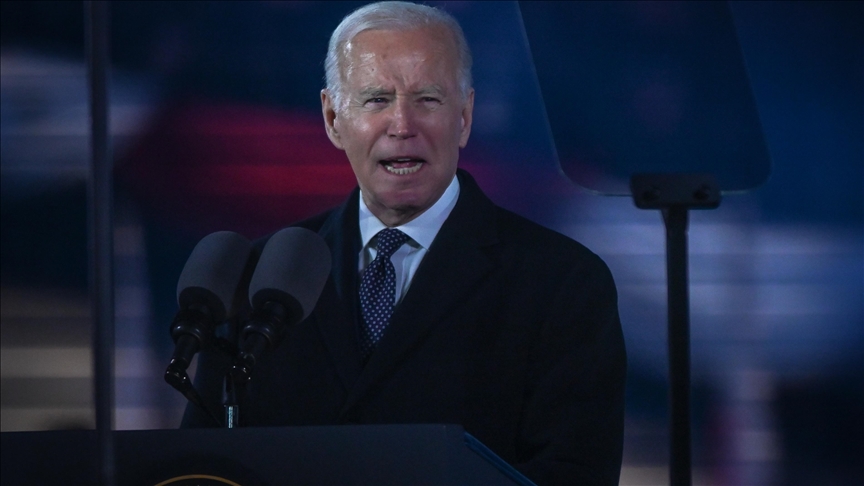

By Anadolu Agency
WASHINGTON
One year after Russia began its war against Ukraine, US President Joe Biden faces a difficult task: maintaining the aid that has proven vital to Ukraine’s defense even as support from the American public wanes.
The Biden administration has supplied Ukraine with nearly $30 billion in military assistance since the Kremlin started its war on Feb. 24, 2022. The aid is intended to help Ukraine defend its borders from an ongoing offensive by Russia that has displaced millions of Ukrainians within the country and without, and killed tens of thousands.
An additional $1.9 billion in humanitarian assistance has been provided to support displaced persons and vulnerable communities, and $13 billion has gone toward funding the Ukrainian government via the World Bank, according to State Department figures.
During a surprise visit to the Ukrainian capital on Monday, Biden struck a defiant tone, telling Ukrainian President Volodymyr Zelenskyy that as his country marks one year since Russian tanks and planes crossed Ukraine’s borders, “Americans stand with you, and the world stands with you.”
“This is the largest land war in Europe in three quarters of a century, and you’re succeeding against all and every expectation, except your own. We have every confidence that you’re going to continue to prevail,” Biden said in Kyiv. “The American people know it matters. Unchecked aggression is a threat to all of us.”
Public more divided
While it is true that a wide bipartisan segment of the US public supports continuing to send Ukraine the assistance it needs to fight Russia, there has been a notable decline of those in favor, particularly among Republicans, the party controlling one house of Congress and normally at odds with the White House of Biden’s Democrats.
This decline applies across a broad range of US support for the besieged country, including military, economic, and humanitarian interventions.
Some 48% of Americans favor continued military support for Ukraine, down from about 60% who said so last May, according to a recently released poll from The Associated Press-NORC Center for Public Affairs Research. About 29% of Americans are opposed to the continued provision of arms, more than double the 11% who said so three months after Russia’s war began.
Among Republicans, opinion is nearly evenly split, with 39% saying the US should continue sending lethal aid, compared to 37% who are opposed. The remainder were indifferent. Democrats are resoundingly more likely to back the policy, with 63% in support compared to just 17% who say it should be stopped.
Similar trends are seen in support for direct economic assistance and accepting Ukrainian refugees. Support is strongest among the public for maintaining economic sanctions on the Kremlin, with 63% of the public continuing to back the measure – a relatively small dip from the 71% who said so in May.
John Feffer, director of Foreign Policy in Focus at the Washington, DC-based Institute for Policy Studies think tank, said “it is incumbent” upon Biden to continue to seek bipartisan support for Ukraine, particularly as opposition is likely to rise as the war drags on.
“In terms of forging some form of bipartisan consensus on Ukraine, I mean, this war is not going to end in the next week. And it’s going to be harder and harder for the administration to convince even its congressional allies to lay out considerable funds going forward,” said Feffer.
Budget battles
The effort to reach across the aisle is likely to become more difficult for the president as he and lawmakers enter what is likely to be a protracted months-long showdown concerning the US budget deficit and raising the dollar amount the US is legally allowed to borrow.
The Republicans, who now control the House of Representatives, have demanded sweeping budget cuts but more than one month into the crisis, their lawmakers have yet to lay out what exactly they would like to see on the chopping block.
The effort to extract concessions from Democrats has seen no shortage of divisions within Republican ranks, however, making it unclear what they may ultimately demand be cut. Ukraine aid cannot be ruled out.
“Anything is going to be fair game from the Republicans’ point of view when entering into these negotiations with the administration,” said Feffer. “They could turn Ukraine into an even bigger bone of contention with the administration around these presumed cost-cutting efforts.”
For Biden, the task will be holding the line for Kyiv and maintaining the sweeping support seen when Zelenskyy addressed a joint session of Congress last year, drawing raucous applause from Democrats and Republicans alike that echoed voluminously through the House chamber.
We use cookies on our website to give you a better experience, improve performance, and for analytics. For more information, please see our Cookie Policy By clicking “Accept” you agree to our use of cookies.
Read More